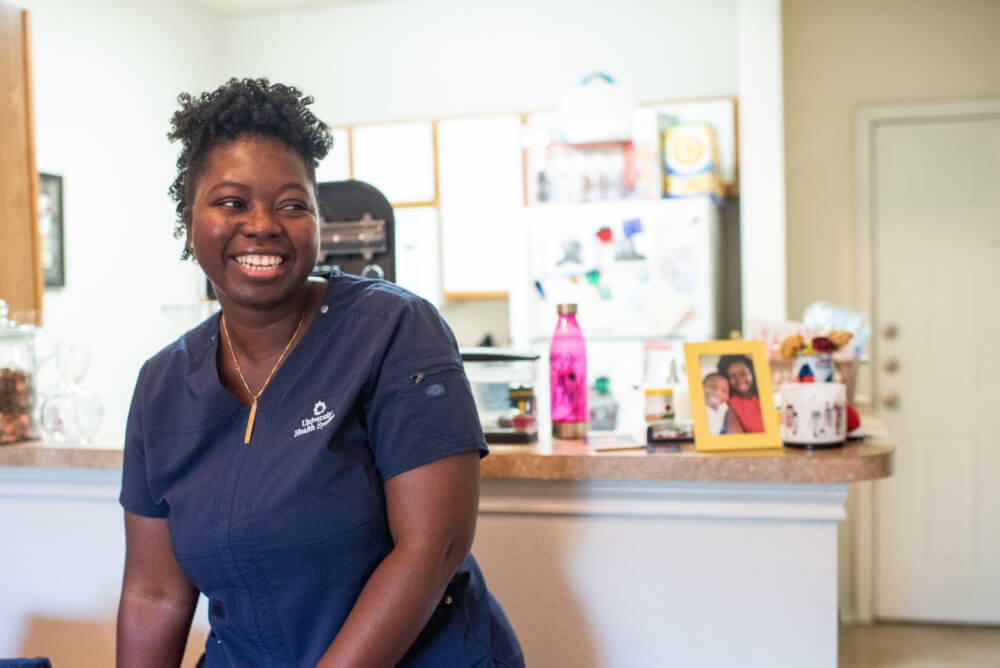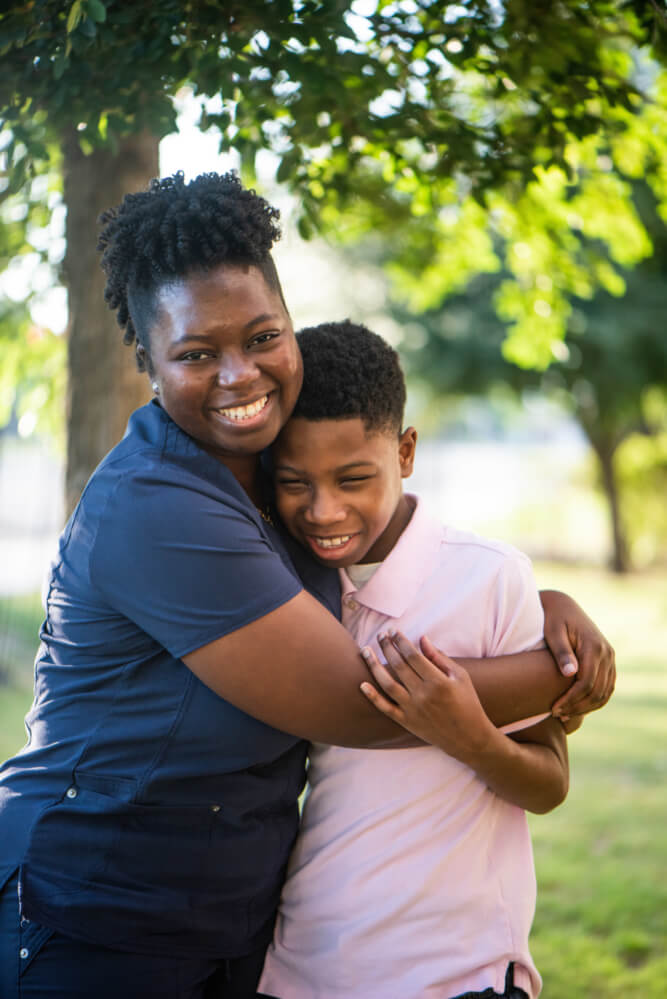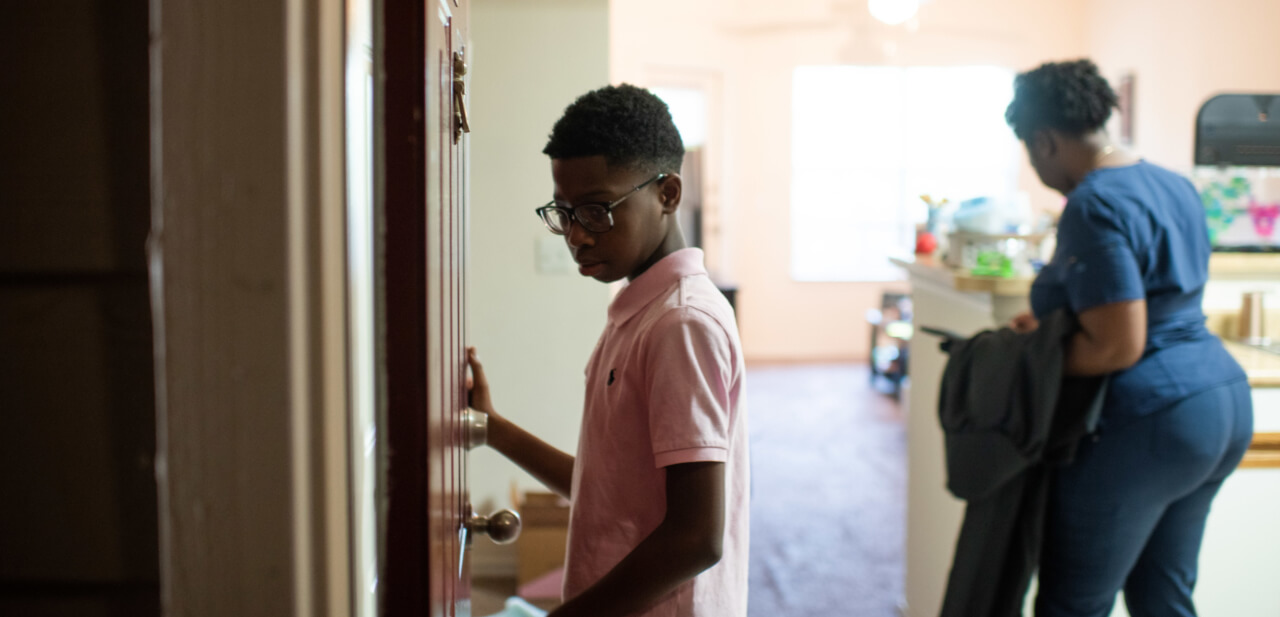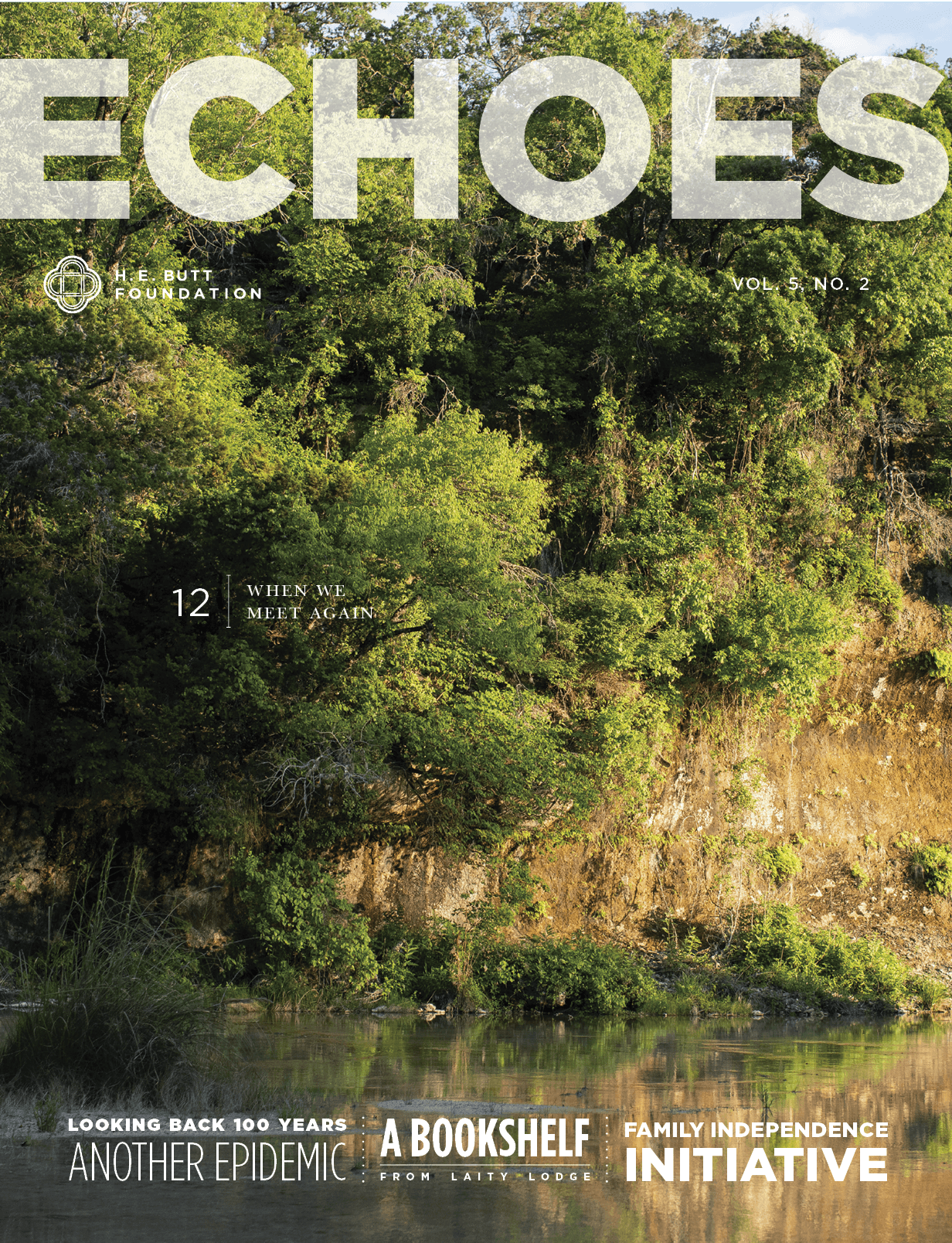
One recent afternoon, while making the hour-and-40-minute commute back home from Coastal Bend College in Beeville, the stresses of Geraldine Anderson’s life began to pile on. The single mom, who’s pursuing an associate’s degree in nursing while working a full-time job, had just finished taking her finals. “The suspense is killing me,” Geraldine said. “Grades are due by 5 p.m., so I’m hoping.” On the drive home, she kept refreshing the college’s website to see if she passed.

Three years earlier, after years of starting and stopping school, Gerldine, 35, got serious and began on the long road toward becoming a nursing anesthesiologist. She’s made it this far with the support of family and friends who act as pressure valves as she continues at an unforgiving pace. They’ve become especially important in the time of COVID-19.
Geraldine holds a job as a licensed vocational nurse at one of the University Health System’s Family Health Centers. With her 12-year-old son Jayden home from IDEA Walzem during the outbreak, his godmother Markisha watches over him via Facetime. Friends have also covered the cost of books for her studies, or sometimes they simply drop off food at their door. “Those are angels in my life,” she said.
She’s also done it with guidance from the City of San Antonio’s job training program and from social service nonprofit Family Service. As soon as she earns her nursing associate’s, she’s going straight into a four-year university for her bachelor of science in nursing degree. “I feel like I’m short,” she says, referring to the grind. “But I know it’s all going to work out.”
In late April, Geraldine received another small but meaningful boost—$500 from an emergency fund formed for people struggling during the crisis. Those dollars were provided thanks to a new partnership led by the Family Independence Initiative (FII) and the H. E. Butt Foundation.
FII is a national organization that puts money in the hands of working families who need someone to believe and invest in their ability to make it out of poverty. The group is adamant about not holding clients’ hands, and instead entrusts them to form their own support groups and make their own decisions with the money as the experts of their own lives.
FII’s philosophy aims to change the narrative and shed biases about people in poverty, which dovetails with the Foundation’s work.

In October 2018, during the Philanthropy Southwest conference in Galveston, Foundation president and CEO David Rogers was telling a colleague about his ambition to change the narrative about working families in poverty. The colleague recommended the book The Alternative: Most of What You Believe About Poverty Is Wrong, by Mauricio L. Miller, who founded FII in 2001.
The strength-based philosophy outlined in the book was radical, Rogers said, but he soon learned that FII had a proven track record, having formed partnerships with thousands of families in cities across America, including Boston, Chicago, and New Orleans.
“The families I learned about through FII challenged some of my own thinking about people experiencing poverty,” Rogers said. “I saw people working hard and trying to overcome their situations, and just needing to be empowered and believed in.”
After months of becoming acquainted with each other, FII and the Butt Foundation partnership began to take shape in October 2019. The partnership grew to include other local philanthropic heavyweights, such as Methodist Healthcare Ministries and the San Antonio Area Foundation, as well as smaller foundations and independent funders, including Laura and Lew Moreman and Carol and Jack McGuire.
“Everybody responded pretty well to the idea of using social capital with direct investment to have a proof of concept with families,” said Perri Rosheger, the Foundation’s vice president of community engagement and communications. “If they have those two things in place, they can really thrive and move out of poverty almost permanently.”
Eventually, the partnership drew the attention of Google.org, which committed an additional $1 million to the expansion of FII in San Antonio.
FII usually enlists families to participate over two years, while tracking their progress. But when the COVID-19 pandemic hit, it was time to spring into more immediate action.
When asked to describe her daily routine, Geraldine laughs, and then laughs some more, trying to conjure the rights words to explain the grind.
“Work, school, cry, pray, repeat,” is how she boils it down.
Some nights she goes straight from work to school. Or, she’ll come home and cook dinner for two. Then she hits the books. She estimates she works 40 to 44 hours a week, while devoting every spare hour to Jayden and her studies. That means not having weekends.
Geraldine supports herself and Jayden making just over $30,000, which is half of the area median income for a family of two according to federal standards. Her family and friends are her safety net, along with programs such as Family Service and the city’s job training program. She was on SNAP benefits for a while, but she’s off that now. Now, it’s her and her son and her support network—and that’s it.
When she received the $500 in COVID-19 relief, it went straight to groceries and study materials.
“Trying to feed a 12-year-old full-time student at home is really, really hard because he doesn’t have the full stomach he had during the school year,” Geraldine said of Jayden, who is a 7th grader at IDEA Walzem.
The cash grants are issued via codes: recipients type the codes into FII’s UpTogether platform, then money transfers into their bank accounts.
“All of a sudden you see they have less stress because they know they have some money to last a little while until they are able to find a job,” said Heather Pullen, director of case management at the SA Hope Center, another one of the nonprofits on the ground doling out the grants.
From there, Pullen’s staff are able to help them apply for unemployment, find a job, or direct them to other COVID-19 relief programs, such as the city’s rental and mortgage assistance program.
“That $500 has really been a lifeline for them before all these other benefits kick in,” Pullen said.

Jesús Gerena, FII’s CEO, likes to distill the initiative into three words: cash, community, choice. When the COVID-19 outbreak hit, Gerena and his team already had the online platform UpTogether ready to disperse cash to families struggling through the pandemic.
“Our conversation was: Are we straying from cash, community, and choice?” Gerena said. “Well yes, because we’re only doing cash. But it’s only because we don’t yet have the technology and features to lead on community. And also if we’re going to give cash, it has to be 100% unrestricted, so people have choice.”
Later this year, FII and the Butt Foundation hope to launch longer-term, two-year partnerships with 1,000 San Antonio families. Over that period of time, the households receive $3,200, while FII monitors their progress within the support community they build for themselves.
Rogers felt this approach was a perfect fit for some of the new work the foundation is doing through its Community Engagement program—that of catalyst and collaborator, rather than creator.
This is “systems change” work, says Rogers, and “trust-based philanthropy. Trust the people that want their families to succeed just as much as you do.” The UpTogether platform is building a case over time that this approach can work, he says.
The data supports the thinking.
“We’re seeing that all of their research is showing that after two years most families are increasing their overall income by over 20% and when you include their social capital, it’s 30%,” Rosheger said. “Why wouldn’t we want to bring something like this to San Antonio and be part of their proof of concept?”
According to FII’s Census Bureau research, 75% of low-income families climb above the federal poverty line within four years, but half fall back under within five years.
Households like Geraldine’s are exactly the kind FII is geared toward helping—those on the margins who are fighting their own way toward a more financially prosperous life. She passed her classes, by the way, but has to retake her exit exam, which she continues to study for, in a few weeks.
“I feel like everybody and everything has been placed around me at the right time,” she said. “It’s still hard, but it makes it doable. It’s hard, but tomorrow’s a new day. It’s a motto, that I have to keep telling myself every day: ‘Tomorrow’s a good day, new blessings, new grace.’”
